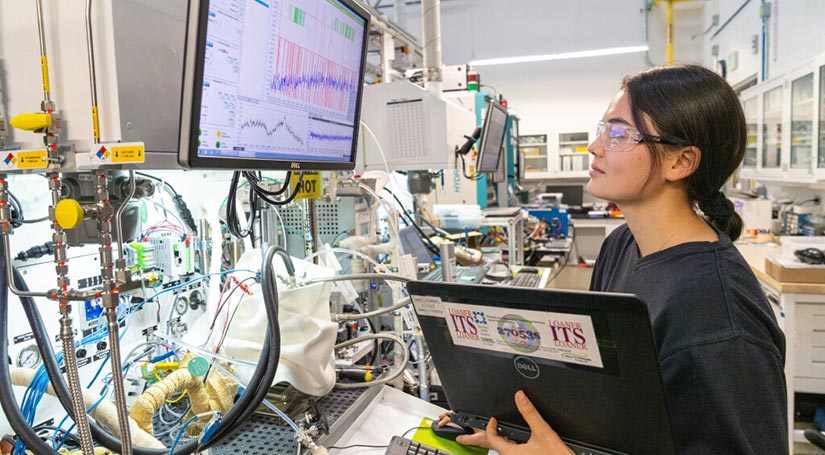Powering Forward: NREL, Puerto Rican Universities Train Next Generation of Energy Scientists

Clean hydrogen has long been hailed as one of the most promising fuels of the future. Produced using renewable energy and electrolysis to split water, it has the potential to replace some fossil fuels with a nearly emissions-free alternative. But there are real barriers to deploying clean hydrogen at scale—not least of which is the fundamental research needed to understand how to produce, use, and store it.
These questions become even more pressing when applied to real-world scenarios. Case in point: the Puerto Rican energy grid. Decimated by natural disasters and reliant on fossil fuels, Puerto Rico's fragile, aging electric grid is a prime candidate to be rebuilt and repowered with renewable energy sources like hydrogen, if researchers can determine how.
Foundational research and the potential of hydrogen to reshape future energy grids are at the heart of a new initiative called the Partnership to Increase Representation in Energy Research in Puerto Rico (PIRES-PR). The program is a joint effort between the National Renewable Energy Laboratory (NREL) and Puerto Rican higher education institutions to help train the next generation of Puerto Rican energy scientists.
With funding from the Reaching a New Energy Workforce (RENEW) initiative and sponsored by the Department of Energy (DOE) Office of Science Basic Energy Sciences program, the partnership ultimately aims to help create the diverse, inclusive clean-energy workforce of the future.
In the summer of 2023, students from the University of Puerto Rico's Rio Piedras, Cayey, and Humacao campuses and Universidad Ana G. Méndez Gurabo and Cupey campuses will travel to NREL, the only U.S. national laboratory 100% focused on renewable energy, for hands-on training and cutting-edge research in the field of electrochemistry.
At NREL, an interdisciplinary team of researchers will train the undergraduate and graduate students in understanding and improving electrocatalysts. These catalysts are key to producing cost-effective, efficient, and renewable hydrogen, which can then be used as a clean alternative to natural gas.
"When hydrogen and oxygen combine, they form water, and in a controlled environment, we can obtain energy from this combination. But in order to obtain enough for the process to be economically viable, we need to develop materials called catalysts, which ease these reactions," said Lisandro Cunci, an associate professor at Universidad Ana G. Méndez–Gurabo Campus and the principal investigator for the PIRES-PR project.
"The main problem is that the best catalysts for these reactions are platinum and platinum-group metals, which are scarce and expensive," Cunci continued. "The students involved in PIRES-PR will be working to understand how to develop replacements for these catalysts. In turn, we hope to decrease their cost, so we can increase the use of hydrogen fuel cells, which are an excellent clean alternative to fossil fuels."
The PIRES-PR initiative has begun at a pivotal moment. With support from DOE and the Federal Emergency Management Agency (FEMA), Puerto Rico has pledged to rebuild its energy grid to generate 40% of its energy from renewable sources by 2025 and 100% by 2050. Energy scientists born and raised in Puerto Rico have a strong stake in the island's energy future and could help to accelerate application of new renewable energy technologies locally. Moreover, PIRES-PR will specifically target underrepresented populations, including women, for research opportunities.
"We are extremely excited to increase the participation of Puerto Ricans in energy research," Cunci said. "We are at an impasse. We have learned the hard way that using only one strategy for the entire island is not working. Now that we are reconstructing our energy system, we need to look for different strategies, and training Puerto Rican students in energy research is part of the transformation."
Bill Tumas, NREL's associate laboratory director for Materials, Chemical, and Computational Science, pointed to the project as a model for future collaborations.
"We are excited about this project and the new model for fundamental research collaboration," Tumas said. "We look forward to working closely with students and faculty from Puerto Rico."
Bryan Pivovar, a senior research fellow and group manager in the Chemistry and Nanosciences Center at NREL, and Shaun Alia, an electrochemistry researcher, will serve as mentors to the students when they visit NREL starting in May 2023.
"These students will get exposure to the research environment we offer at NREL, which has resources, capabilities, and facilities that aren't available at academic institutions," Pivovar said. "I love the fact that we are going to be able to offer them something that only a national laboratory can provide: putting their materials into world-class devices, stressing them under realistic operating conditions, and looking at what happens to them afterwards. It's a great opportunity for them to contribute to research being done at the front lines.
"Their contribution to moving the scientific field forward is important," Pivovar continued, "and so is the development of the next generation of scientists."
Learn more about NREL's basic energy sciences programs and research.

